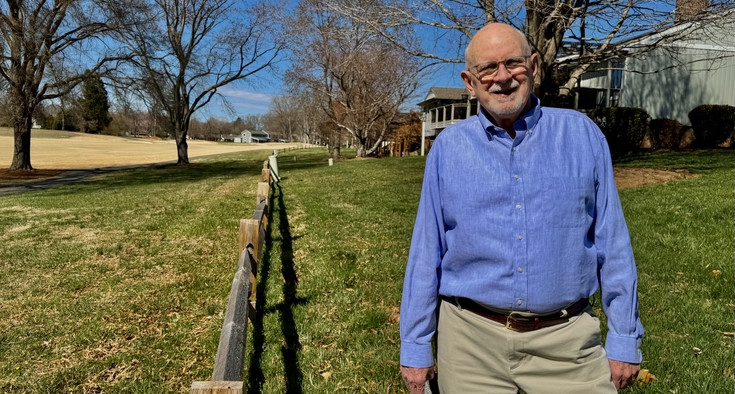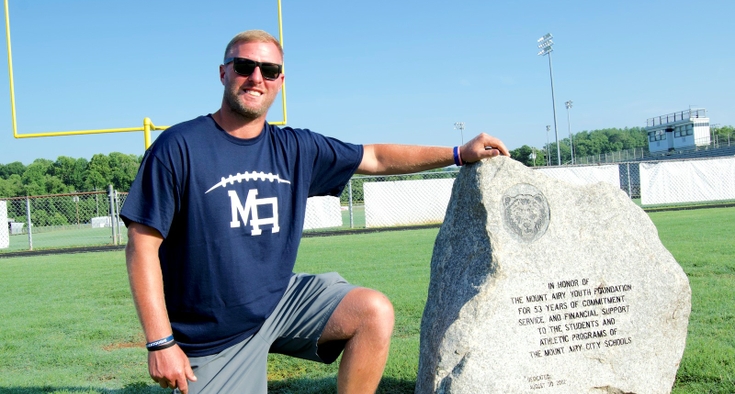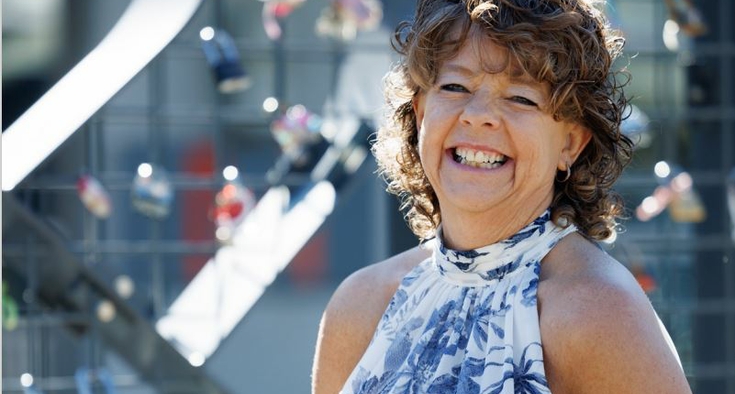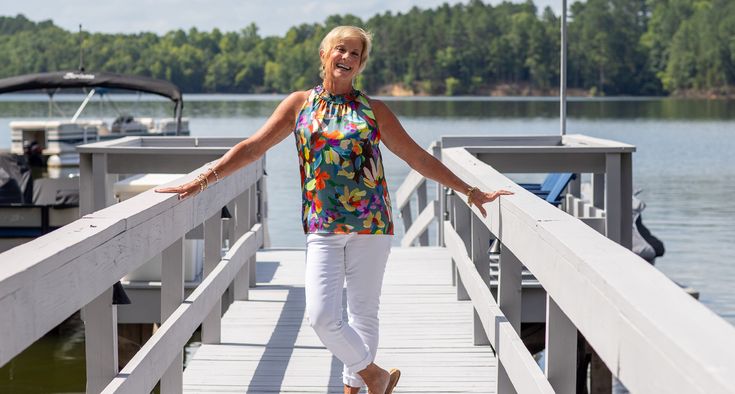Bob Drawdy, 76, was so stunned when Dr. David Hiller told him he had rectal cancer he wasn’t sure how to react.
Sitting with his wife, Ann, in Hiller’s office at Novant Health Colon & Rectal Clinic - Clemmons, Bob pulled himself together. He considered the diagnosis. Then he told Hiller he wanted to live five more years.
“How about 15?” Hiller responded.
“I said, ‘You’re hired.’”
Get supportive care from colorectal cancer experts.
This was in January 2022. Stomach pain and blood in his stool led Drawdy to Hiller. A colonoscopy found the tumor. The word “cancer” has long struck fear in Bob’s heart. He lost his father to lung cancer at age 60, then his mother to ovarian cancer at age 56. Bob thought his own diagnosis was a death warrant.
But Drawdy believed in Hiller even if he joked about the doctor’s youthful appearance. “Are you out of high school yet?” Drawdy asked in jest. (FYI, Hiller, 42, graduated from Wake Forest University and LSU Health Shreveport School of Medicine in his native Louisiana.)
Turns out he didn’t need Hiller’s skills as a colon and rectal surgeon. Instead, he underwent six weeks of radiation plus chemo pills mornings and afternoons. That was followed by chemotherapy through a port. Bob handled the treatment with minimal side effects. He remained positive throughout.
“He has a really keen desire to live,” Ann said. He felt blessed to avoid surgery. And everyone at Novant who helped take care of him left a lasting impression. They seemed to radiate kindness.
Hiller said advances in treating colorectal cancer are such that 10 years Drawdy might have needed surgery and a colostomy bag. “Nationally accredited rectal cancer centers such as Novant’s are showing increased rates of curing rectal cancer without requiring any surgery at all,” he says. “Even in cases needing surgery, a large majority of patients are able to be cured of this disease.
“Bob is a great example of the advancement of medicine in the last few years,” Hiller said. “This didn’t end his life. He beat it.”
‘He still makes me laugh’
Drawdy goes for an MRI and sigmoidoscopy every six months to make sure he is cancer-free. Less invasive than a colonoscopy, a sigmoidoscopy checks the lower part of the colon for abnormalities. You still have to drink the dreaded prep.
“It’s wonderful,” Drawdy said with good-natured sarcasm.
Meeting the highest standards
The National Accreditation Program for Rectal Cancer (NAPRC) is a voluntary accreditation created by the Commission on Cancer to indicate hospitals demonstrating the highest standards in rectal cancer care. Novant Health's Presbyterian Medical Center in Charlotte, Forsyth and Clemmons medical centers, Huntersville Medical Center, and Matthews Medical Center are among six North Carolina cancer centers and just 96 nationwide certified as centers of excellence in rectal care. All four earned perfect scores during the NAPRC review.
Retired from running the family’s second-generation cleaning supplies business with his brother, Bob and Ann enjoy life at their home in Bermuda Run, outside Winston-Salem. They love spending time with their five children and seven grandchildren. They play golf and work out at the gym. When Ann recently baked a batch of banana nut muffins, all 12 were gone before she could say, “BOB, PUT THAT DOWN!”
Drawdy’s Christian faith and family support put spring in his step. His sense of humor, Ann said, and natural-born zest reflect the essence of his nature.
“I married him because he made me laugh,” she said. “He still makes me laugh.”
You can almost hear Drawdy in the background, smiling as he listens to Ann on the phone, going on about his virtues. Why shouldn’t he smile? He gets to say the words that every cancer survivor is blessed to be able to say.
“Here I am."
Colorectal cancer fast facts
- An estimated 152,810 new cases of colorectal cancer were diagnosed in 2024. It is the second leading cause of U.S. cancer-related deaths – 53,010 in 2024.
- Screening for colorectal cancer (colonoscopies) should begin at age 45 and repeated every 10 years if no abnormalities are found.
- Those with a family history and other increased risks should consult their doctor. So should those who experience any of these symptoms: A change in bowel habits (diarrhea, constipation or narrowing of the stool); rectal bleeding or blood in the stool; abdominal pain, cramps or discomfort; feeling that the bowel doesn't empty completely during a bowel movement; and unintentional weight loss.
- To lower the risk of colorectal cancer, have regular screenings, eat lots of vegetables, fruit and whole grains, exercise, watch your weight, don’t smoke and avoid alcohol or reduce your consumption.
- Dr. David Hiller directs Novant Health’s National Accreditation Program for Rectal Cancer. It is the third such program in North Carolina. Fewer than 100 U.S. hospitals have earned this accreditation.
Source: American Cancer Society












